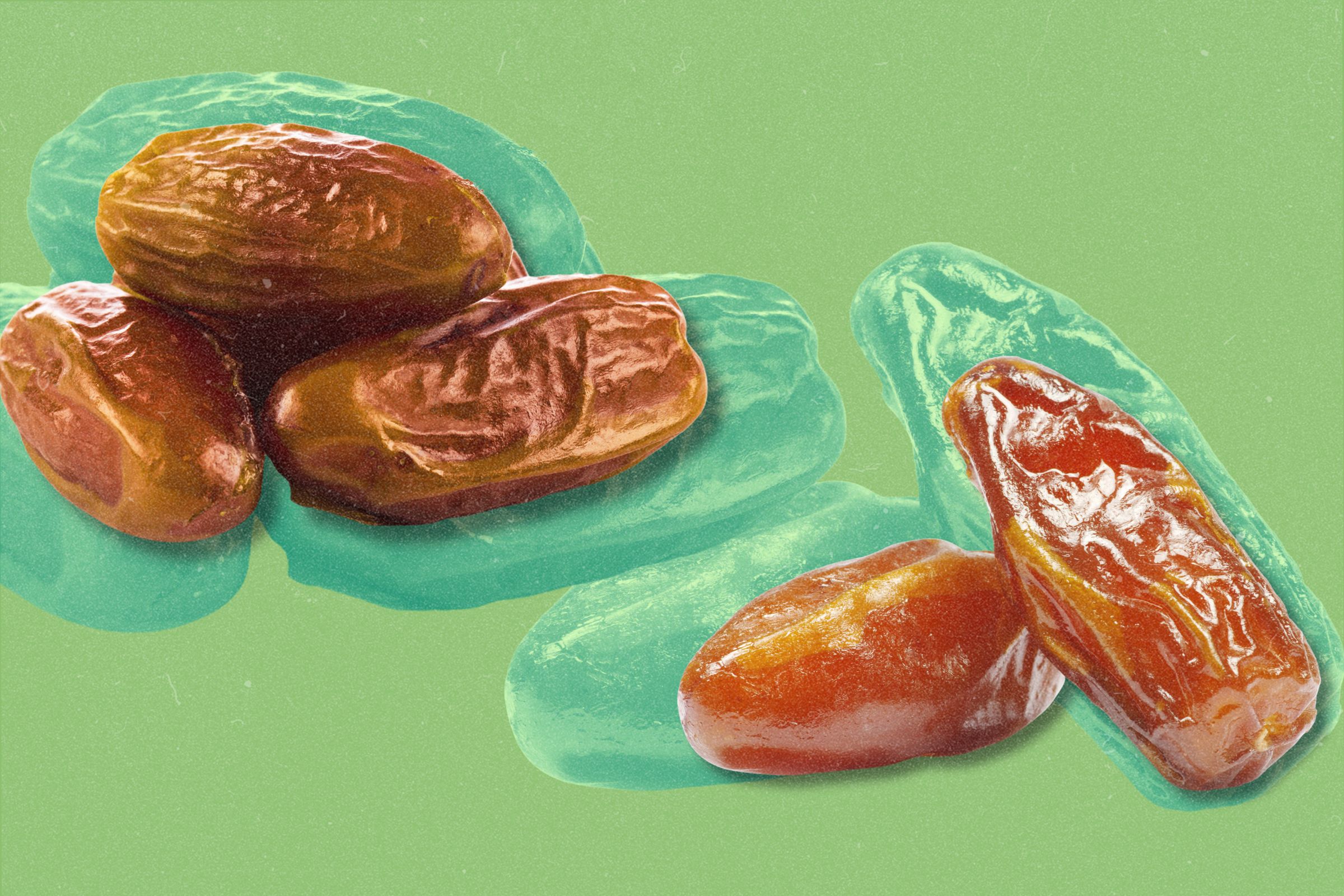All of a sudden, it feels like everyone is obsessed with dates: the brown, shriveled fruits from tropical date palm trees that resemble large raisins. Dates are the subject of countless, gushing social-media posts proclaiming that the sweet fruits improve digestion and blood sugar, give you more energy, and benefit various organs. Plus, they’re a natural way to sweeten baked goods, smoothies, and desserts.
But do dates really pack such big perks? We spoke with registered dietitians about what dates can and can’t do for your health and how to incorporate them into your diet.
[time-brightcove not-tgx=”true”]
Dates are high in fiber
Four dates usually make up one serving: a tasty snack with fewer than 300 calories. “You get a lot of nutrition in a small package,” says registered dietitian nutritionist Melissa Mroz-Planells, spokesperson for the Academy of Nutrition and Dietetics.
Most of the calories come from carbs, including about 7 grams of fiber. Adults typically need around 22 to 34 grams of fiber each day, but by some estimates, only 10% of Americans get that much. Those 7 grams can make a dent—and getting plenty of fiber helps lower cholesterol, fills you up for longer, and guards against constipation, Mroz-Planells says.
They provide quick energy
Your body uses sugar, a form of carbohydrate, for energy, and dates deliver plenty. In that four-date serving, there are about 66 grams of sugar.
Eating foods that are high in sugar without other nutrients leads to spikes and crashes in energy—the notorious sugar high. But even though dates contain a lot of sugar, their high fiber helps counteract blood sugar spikes, says registered dietitian nutritionist Gregory Lafortune. “A lot of other products that contain sugar, for example, like a bottle of soda, do not contain any fiber,” he says.
Read More: Why Your Diet Needs More Fermented Pickles
That said, if you have insulin resistance—meaning your body doesn’t regulate your blood sugar as it should, which is common with prediabetes, Type 2 diabetes, and polycystic ovary syndrome—you may need to be more cautious and monitor your blood sugar when you eat dates, Lafortune says.
Dates deliver a little protein
Amino acids are often referred to as the building blocks of protein, which your body uses to build muscle and repair tissue. Considering dates are so sweet, it may be surprising to learn a serving contains about 2 grams of protein.
That won’t do much to help you meet your daily protein needs (which would be roughly 100 grams a day if you’re following a 2,000-calorie daily diet), but it’s still a perk that dates have over something similarly sweet that doesn’t have any protein, Mroz-Planells says.
Influencers like to hype up the fact that dates contain all nine of the so-called essential amino acids that your body can’t make on its own. And while that is technically true, those social-media posts don’t usually mention that you’re getting a really small amount of them. “Dates can very well contain a wide variety of those amino acids, but they do not contain a very hefty amount of protein,” Lafortune says.
They pack electrolytes
A serving of dates has about 15% of your daily values for potassium and magnesium, two important minerals that function as electrolytes, Lafortune says. (In fact, just four dates contain more potassium than a banana.) Electrolytes maintain the right balance of fluid and salts in the body, staving off dehydration and keeping heart rate and blood pressure stable. Your kidneys help regulate this balance, but there’s no evidence eating dates helps with kidney problems or so-called “adrenal fatigue,” like some social-media posts claim. In fact, if you have kidney problems, you may actually need to eat less potassium.
Read More: The Latest Breakthroughs That Could Improve Kidney Cancer Treatment
Dates are rich in copper
You’ll also get about 40% of your daily recommended amount of copper in a serving of dates. That’s helpful because copper is involved in red blood cell production, Lafortune says; when you don’t have enough healthy red blood cells, you might feel fatigue or get short of breath easily. Copper also helps make collagen in your body, he adds, which is a crucial component of connective tissue and bone. This contributes to skin elasticity, he says, but isn’t likely to overhaul your skin’s appearance in two weeks, like some influencers have claimed.
How to eat dates
If those benefits sound convincing and you’re ready to give dates a try, you can eat them plain right out of the package. You can find fresh and dried dates in many grocery stores; the dried variety may even already be pitted and diced.
But you can also get a little more creative: Dates are versatile, lending themselves to sweet and savory preparations, Lafortune says. (Just make sure you’re removing any pits first.) Here are some of his and Mroz-Planells’s favorite ways to enjoy dates:
Blend them into smoothies
Chop them up and roll with nuts, oats, and nut butter to make energy balls
Slice them open, fill with peanut butter, and top with a few dark chocolate chips for a take on a peanut butter cup that’s higher in nutrients and lower in added sugar
Chop them up and toss them into salads, oatmeal, or yogurt
Purée them into a paste and use the blended dates as a one-to-one sugar replacement in baked goods
Social media fads come and go, but dates are a trend worth hopping on—if you like them, that is. “It’s great when healthy foods like dates receive the spotlight, but it’s not like you have to eat dates,” Lafortune says. “You can incorporate them into a balanced diet, but you shouldn’t depend on dates to be a magic cure for every ailment.”

